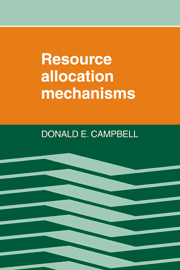Book contents
- Frontmatter
- Contents
- Preface
- Chapter 1 Introduction
- Chapter 2 Performance criteria
- Chapter 3 The Arrow–Debreu world
- Chapter 4 Uncertainty
- Chapter 5 Incentive compatibility
- Chapter 6 Existence of a competitive equilibrium
- Chapter 7 Welfare properties of the Walrasian mechanism
- Appendix 1 Elements of consumer choice
- Appendix 2 The Edgeworth exchange economy
- Appendix 3 Proof of the Shafer–Sonnenschein theorem
- References
- Author index
- Subject index
Chapter 5 - Incentive compatibility
Published online by Cambridge University Press: 05 June 2012
- Frontmatter
- Contents
- Preface
- Chapter 1 Introduction
- Chapter 2 Performance criteria
- Chapter 3 The Arrow–Debreu world
- Chapter 4 Uncertainty
- Chapter 5 Incentive compatibility
- Chapter 6 Existence of a competitive equilibrium
- Chapter 7 Welfare properties of the Walrasian mechanism
- Appendix 1 Elements of consumer choice
- Appendix 2 The Edgeworth exchange economy
- Appendix 3 Proof of the Shafer–Sonnenschein theorem
- References
- Author index
- Subject index
Summary
This chapter presents three important results on the possibility of designing a resource allocation mechanism that gives each agent the incentive to follow the rules in every situation.
The proof that a Walrasian competitive equilibrium is Pareto optimal does not assume a large number of agents. It does assume that agents take prices as given. Section 5.1 shows that this assumption is suspect: Any mechanism that improves the well-being of each agent and yields Pareto-optimal outcomes can be manipulated. Someone, in some situation, will have an incentive to violate the rules governing the behavior of agents. Section 5.2 proves that any gain from a violation of the rules of the Walrasian mechanism will be miniscule if each commodity has a large number of suppliers. Therefore, it will not be worth anyone's while departing from prescribed behavior in that case. The last section shows that manipulation – a rule violation that cannot be detected – is inevitable in mechanisms that determine the Pareto-optimal supply of a public good and, unlike the case of the Walrasian mechanism, the difficulties do not fade as the number of agents increase, whatever mechanism is used.
The phenomenon on which to focus attention is the ability of an agent to influence prices by taking into consideration the effects of his decision on demand or supply. The most easily understood instance is that of a monopoly. The monopoly will optimize by producing at the point where marginal revenue equals marginal cost.
- Type
- Chapter
- Information
- Resource Allocation Mechanisms , pp. 109 - 125Publisher: Cambridge University PressPrint publication year: 1987



